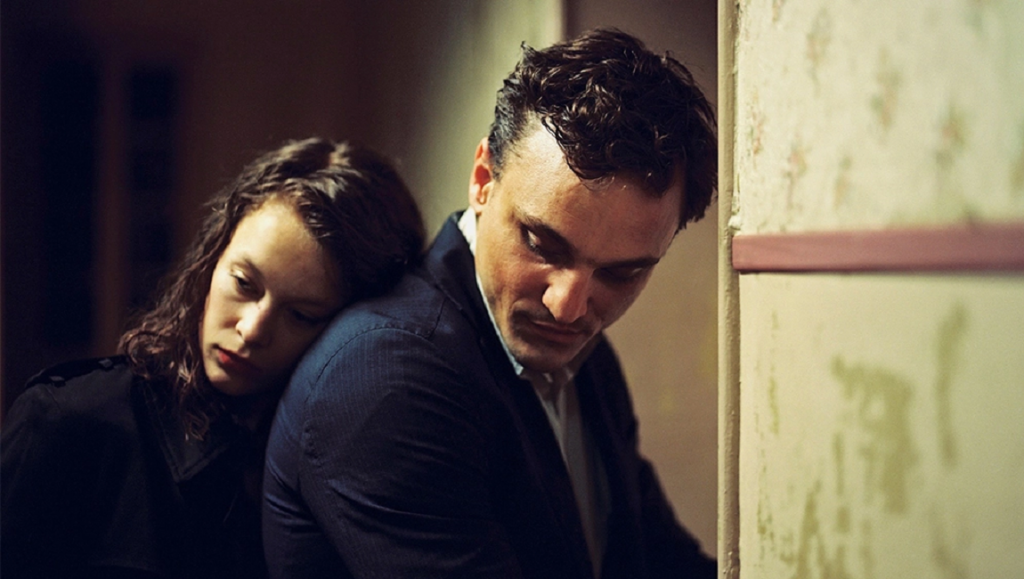2018’s Transit followed two period pieces, each set in a specific era highly important to director Christian Petzold: Barbara, which unfolds in East Germany in the 1980s, and Phoenix, which takes place in the immediate wake of WWII in a rubble-strewn Berlin. The detailed, historically contextualized milieus of Barbara and Phoenix give way in Transit to a diffuse, psychologically charged phantom zone. Transit, then, marked several departures for Petzold: it was his first narrative project in any medium written without Harun Farocki, his mentor and frequent collaborator, who died before the film’s production, as well as Petzold’s first film without long-term leading lady Nina Hoss since 2005’s Ghosts (by all accounts a mutual, and temporary, parting of ways).
Petzold is one of our great contemporary dramatists, taking the building blocks of classical melodramas and draining them of their artificiality; he’s a kind of quotidian, brutalist Sirk. In his work, what could be narrative convenience or lazy coincidence instead becomes a kind of tragic, cosmic inevitability. Beginning in media res, Transit opens with two men discussing their plans for escaping Paris, what to do with their comrades currently in hiding, and how to safely pass illicit letters. Outside the cafe windows, police cars go screaming by and soldiers come marching up the street. Then, the voiceover begins, an omniscient third person narration that is strikingly incongruous with what we see on screen. In a bold, destabilizing formal gambit, Petzold has married specific, detailed passages from Anna Segher’s 1944 source novel into the film’s narration. While the actors, clothing, vehicles, and buildings are clearly modern, the narration speaks of personal, WWII-era experiences. Images on the screen and the soundtrack collapse the distinction between the two eras, existing simultaneously in both a contrapuntal and mirrored relationship with each other. The intermingled temporal elements are in keeping with Petzold’s fascination with the past “haunting” the present, here rendered very literally. As critic Neil Bahadur wrote upon the film’s initial release, this conceit not only suggests the liminal space occupied by the film’s characters — trapped between countries, desperate for escape — but also a new liminal space between past and present.
Ultimately, the narrative becomes a crypto-remake of Casablanca by way of Antonioni’s The Passenger, as Georg (Franz Rogowski), one of the men from the cafe, agrees to meet a writer named Weidel, but finds only the man’s belongings, including an unpublished manuscript and various correspondences with government officials. Georg takes them, and while fleeing from the police, winds up on a train with an injured comrade named Heinz. Heinz dies in transit, and upon arriving in the port city of Marseille, Georg assumes Weidel’s identity. Georg also becomes entangled with Weidel’s wife, Marie (Paula Beer), who’s searching for her husband and doesn’t know that he’s dead, while also unaware that Georg is impersonating him. Georg’s efforts to attain exit visas take him into the labyrinthine bureaucracy of the city, where he queues with other refugees for hours on end. Georg also strikes up a friendship of sorts with Heinz‘s wife and young son, his paternal relationship with the boy complicating Georg’s attempts to flee France for Mexico. It’s a complicated web of confused and mistaken identities, as Georg feigns at helping Marie find her missing husband while he maintains his charade behind her back. Intimations of Vertigo, Petzold’s cinematic ur-text, abound, as does Petzold’s fascination with emptied-out urban spaces. For him, the displacement of masses of people is a defining characteristic of the 20th and 21st centuries, the unfortunate by-product of neoliberal globalization. Like many of Petzold’s best films, Transit builds to an emotionally devastating conclusion, his precise, even cold formalism giving way to a profound humanist streak. It’s a remarkable film, a disturbing vision of a vaguely apocalyptic European Union that still maintains some vestiges of hope.
Part of Christian Petzold: In the Cut.


Comments are closed.